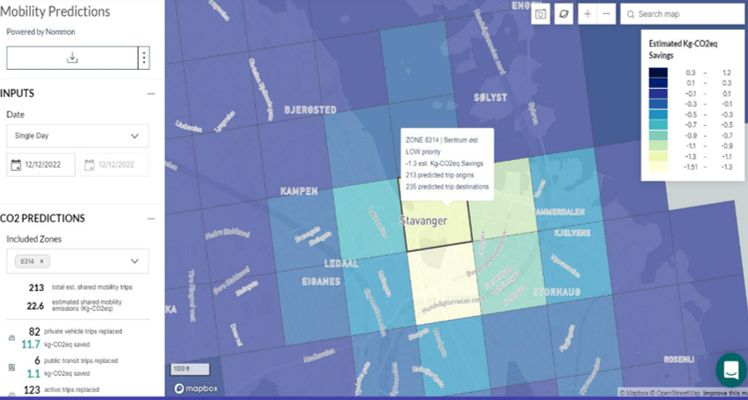AVENUE lets cities evaluate carbon footprint of shared mobility policies
13 January 2023
AVENUE, developed by Nommon and Populus, creates demand prediction that estimate the number of trips captured by shared mobility services, and substitution mode models that unveil which mode would be used if shared mobility services were not in place. The outcome of these models can help policymakers to evaluate the carbon footprint effects of different possible measures by combining it with an estimation of the emission factors of each urban transport mode.
The solution is built upon two machine learning models: a regression model that predicts the demand for shared mobility services for each origin-destination pair, and a classification model that infers the substitution mode that would be used if the shared mobility service were not available. The combination of these models allows AVENUE not only to predict future demand of shared mobility services under certain policies, but also to predict modal shift effects, which in turns enables the estimation of the impact of shared mobility services on the carbon footprint of the city.
The project team has identified two key clients for the use of AVENUE. Firstly, local and metropolitan transport authorities that are in charge of developing mobility strategies and plans, regulating how mobility services are implemented through licenses or tendering processes, or monitoring and enforcing the compliance of shared mobility operators with the regulations in place. They can use the insights provided by the tool to formulate evidence-based policies and adjust regulation to meet policy objectives. Secondly, shared mobility operators, could use the platform to support both their strategic decisions regarding service expansions and their operations, ensuring vehicle availability for satisfying the expected demand.
AVENUE was piloted in Stavanger and Tallinn. Avenue’s participation in AI4Cities enabled the project team to gather direct feedback from the end-users. The cities’ involvement has also been extremely valuable for further defining the solution development roadmap, covering more functionalities and relevant aspects considered by cities to become carbon neutral.
Image (Avenue)
All news
